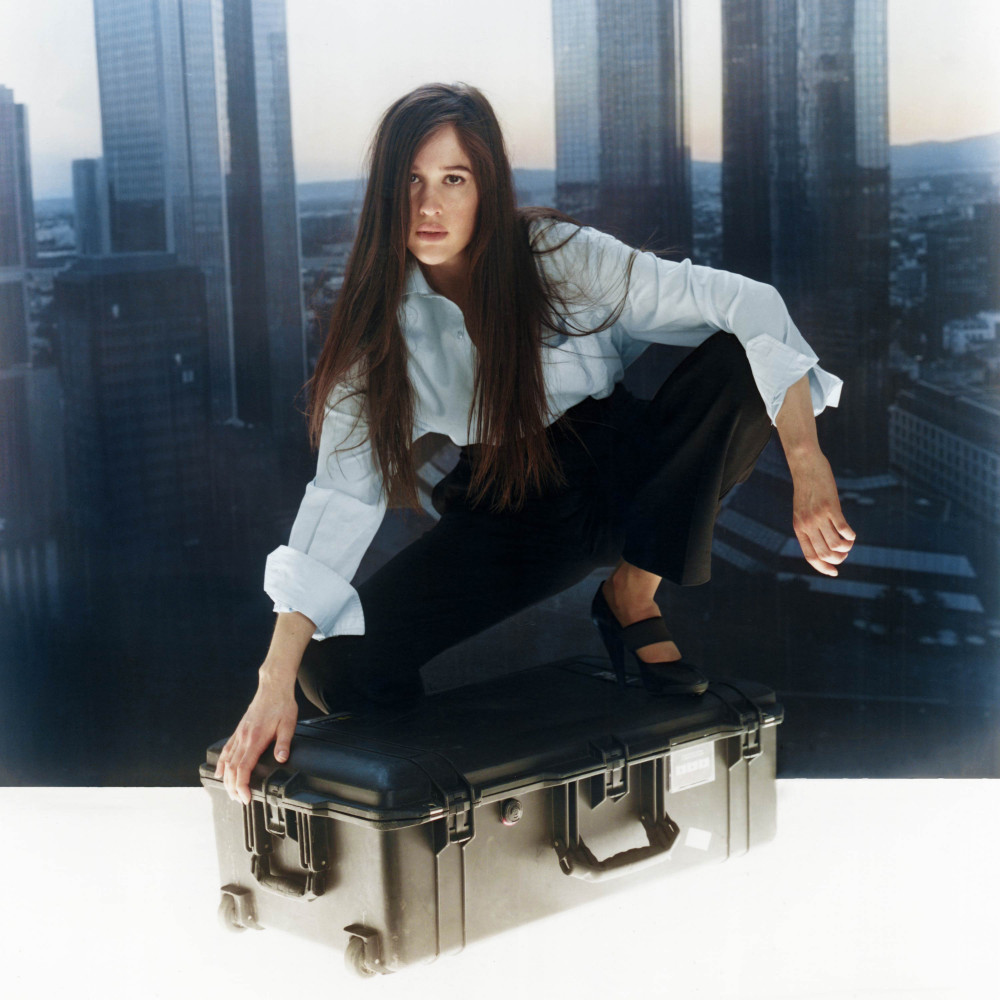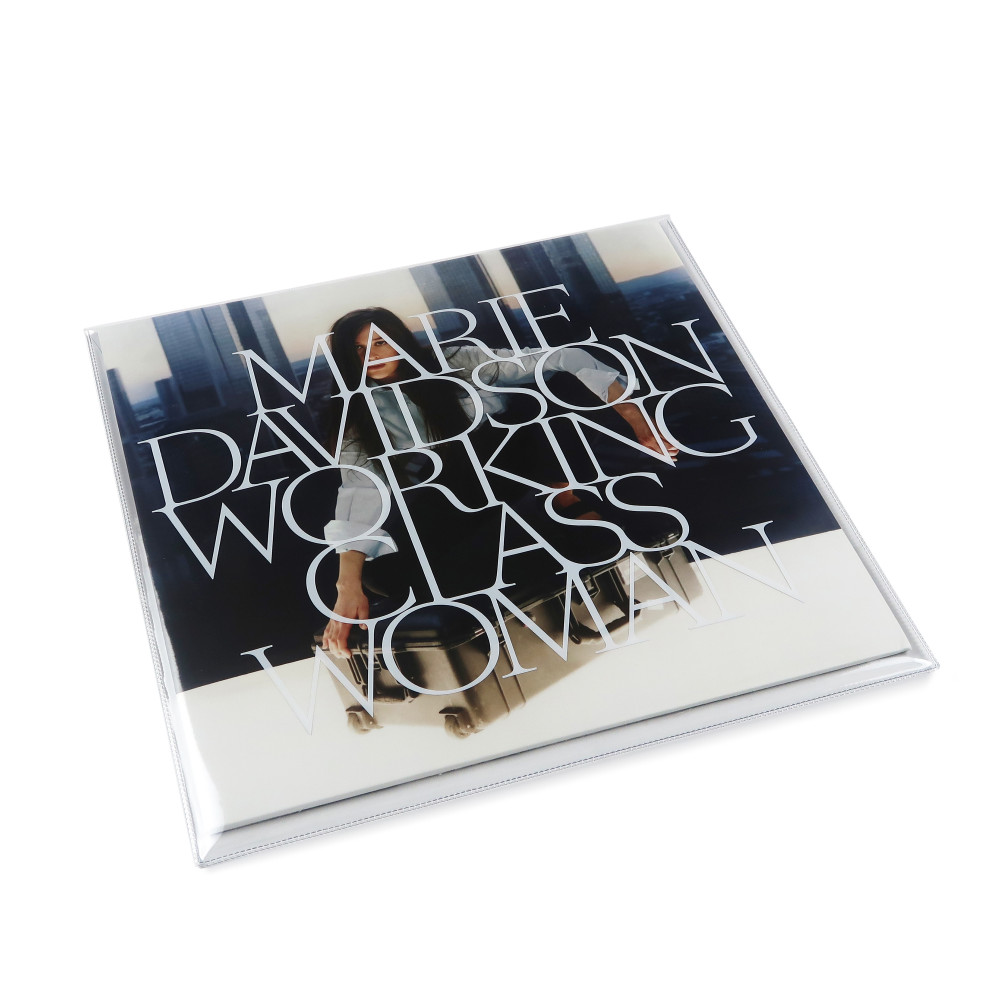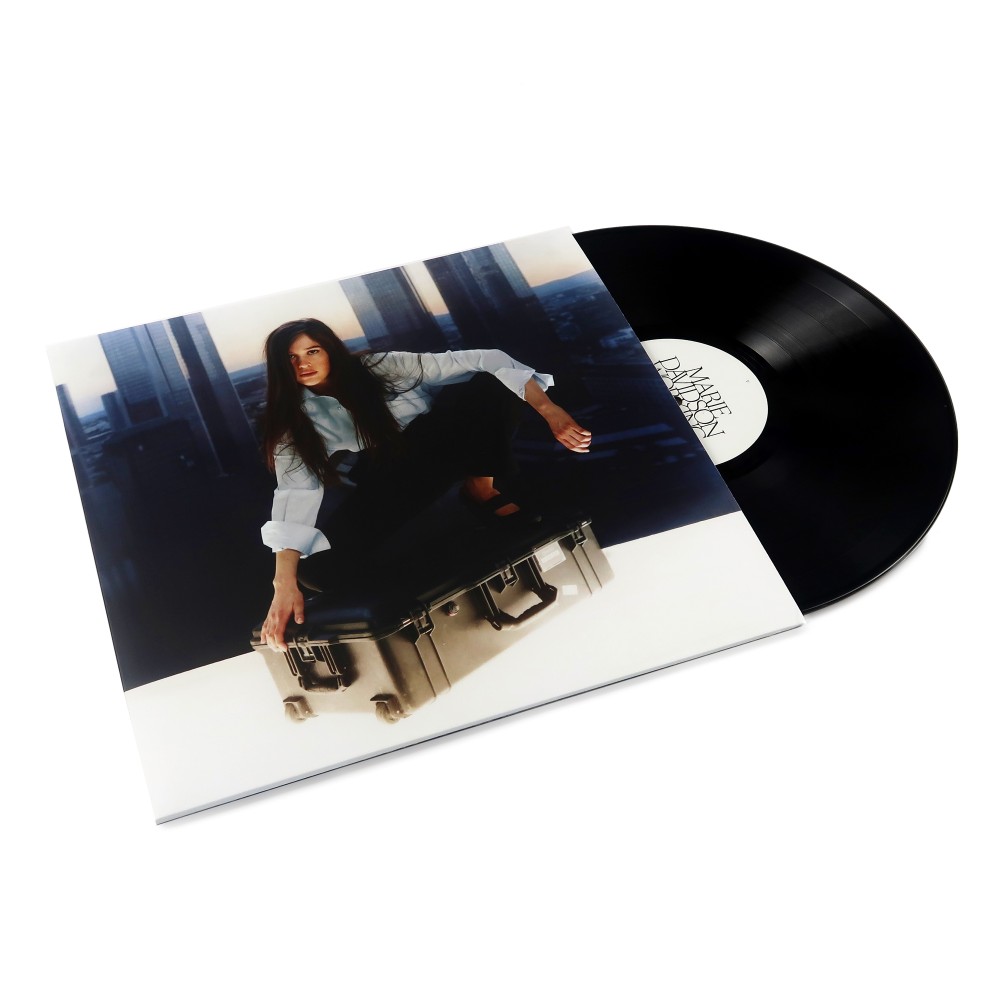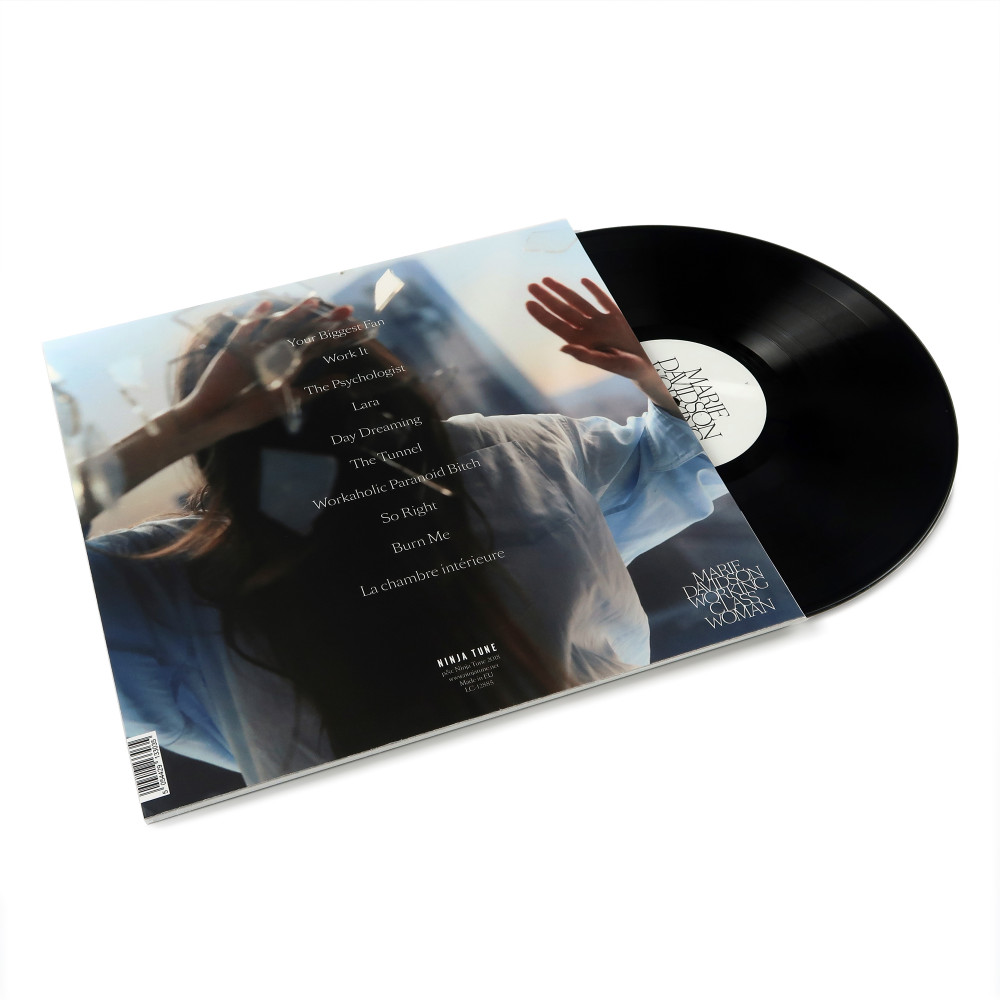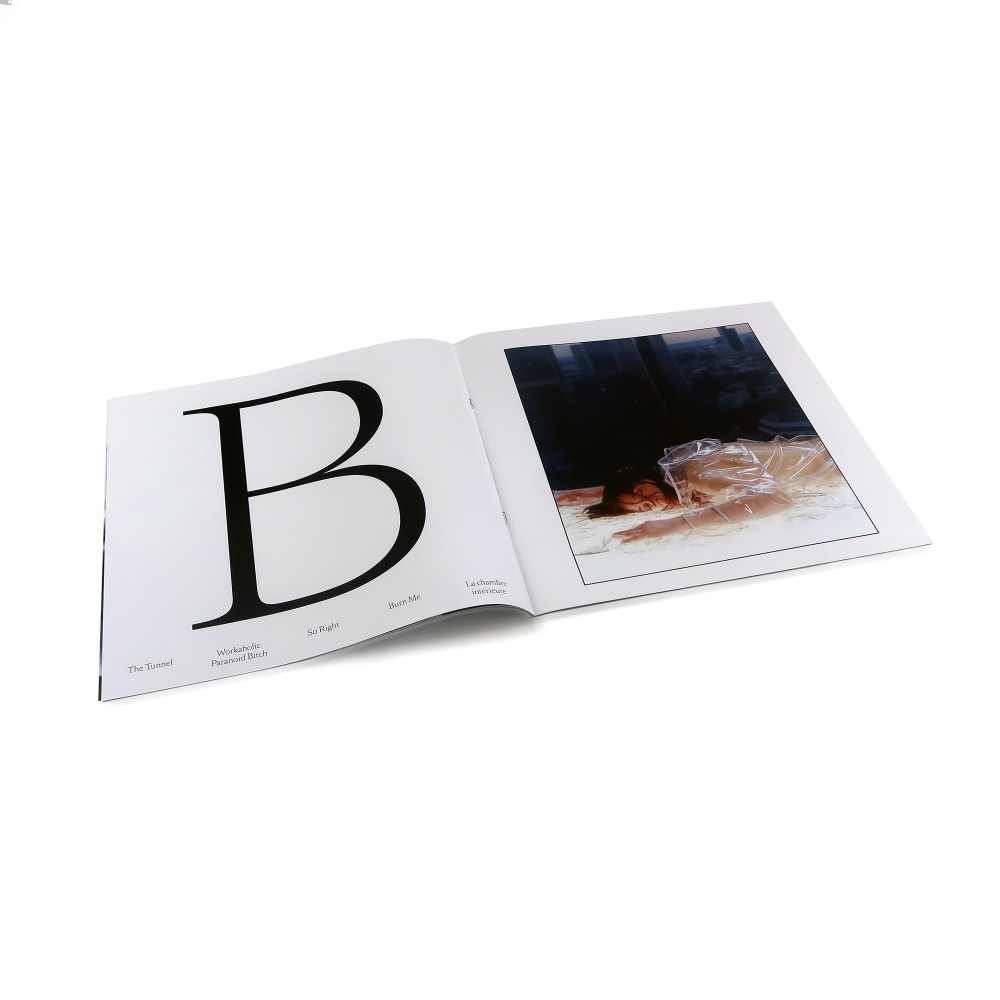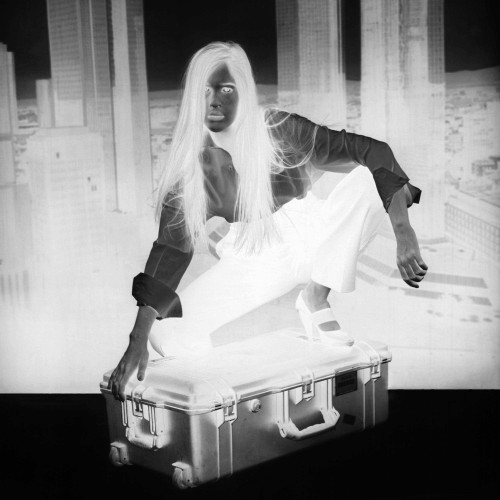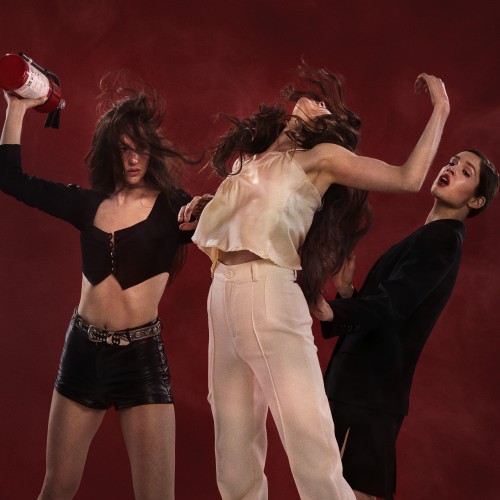Working Class Woman
by Marie Davidson
— Released 5th October 2018
Marie Davidson’s new album turns the mirror on herself. "Working Class Woman” is the Montreal-based producer’s fourth and most self-reflective record: it’s a document of her state of mind, a reflection of the past year she’s spent living in Berlin, and a comment on the stresses and strains of operating within the spheres of dance music and club culture. Drawing on those experiences, as well as an array of writers, thinkers and filmmakers who’ve influenced her, Davidson’s response to such difficult moments is to explore her own reaction to them and poke fun. “It comes from my brain, through my own experiences: the suffering and the humour, the fun and the darkness to be Marie Davidson.” It’s an honest document of where she currently stands. As she puts it, “It’s an egotistical album – and I’m okay with that.”
She builds on the dancefloor-minded trajectory charted by her previous record "Adieux Au Dancefloor” [Cititrax / Minimal Wave], which drew praise from the likes of Pitchfork (“a project that indicates exciting and near-exponential growth in her ability as a writer and producer”), The Fader and Resident Advisor, and opened up her sound to a new, wider audience, earning support from peers such as Nina Kraviz and Jessy Lanza. The record is informed by a career which has spanned an ambient-influenced album as Les Momies De Palerme for Montreal’s Constellation label (home to Godspeed! You Black Emperor); her synth-disco styled duo DKMD with David Kristian; and Essaie Pas, signed to DFA, and with whom she’s shaped minimal synth and "cyberpunk coldwave” (the Guardian) sounds into a fresh mould, in partnership with husband and collaborator Pierre Guerineau.
The sound of "Working Class Woman" is more direct than any of her previous outings. She still mines the same influences, from Italo Disco, to proto-industrial and electro, but leadens them with a gut-punching weight, making for a record that’s more visceral than any she’s released before. It’s combined with her characteristically-deployed spoken text – rather than spoken word, which she sees as a distinct tradition – that carries a more darkly humourous edge than before, making observations on both aspects of club culture as well as more oblique critiques of the modern world. It’s a record poised between dark and light. Industrial heaviness is balanced by Davidson’s words; dark, textured soundscapes are counterweighted by statements or observations which never take themselves too seriously. It’s something that’s encapsulated in the driving momentum of ‘So Right’: it matches pared back lyrics with a melodic bassline and bright synths, her words sketching out a euphoric feeling that chimes with the music. It’s the first single from the record, and comes backed by a John Talabot remix, where he slows down the momentum, creating a mellow pace guided a languorous bassline.
In ‘Work It’, she probes her workaholic nature. In her opening spoken line, she declares, “You wanna know how I get away with everything? I work, all the fucking time.” The track is, appropriately, unrelenting: it’s a robotic, jacking groove that’s short but sweet. This track also hints at another influence on the record, which is Davidson's response to her life as a touring musician. Both under her own name, and with Essaie Pas, touring has taken up the best part of her last year and is an experience which she’s found both enriching and draining. Her stops have included Sonar Festival - where she performed her "Bullshit Threshold” show, combining performance, spoken text, video projections and analogue hardware - Primavera, Dekmantel and MUTEK in recent times. On the one hand, her live set is a creative endeavour that feeds back into her music. Playing, and travelling, on her own - which means marshalling a table of gear including sequencers, synths and a mic for her to sing and talk into (as well as transporting them between each of her shows) - allows her to improvise and play each set in a different way to the last. But at the same time, it requires her to project a persona: a demand that can become dispiriting.
Another of the album’s early moments is ‘The Psychologist’, carried by a moody techno swagger that suggests a playfulness evident throughout the record. On ‘Day Dreaming’, soft chimes provide a moment of colourful respite, swirled around with a soft-focus ambience. In contrast, ‘The Tunnel’ is an ominous deep-dive into industrial sound-blasts, where Davidson darkly narrates, “I'm in the tunnel with all the other monsters and it's so messy.” And in ‘Burn Me’, she takes a turn at a more straightforward club rhythm, building up drones, an acid bassline and flashes of percussion into a tense slow-burn.
Part of her response to these difficult scenarios is to turn to writers whose work offers guidance or inspiration. Recently, this has meant the likes of psychologist Alice Miller, physician Gabor Maté and filmmaker Alejandro Jodorowsky (in particular, his book Psychomagic). Their work explores ideas of the self and the ways in which people develop; relating their theories or stories to herself, it’s pushed her to explore the notion of therapy in relation to art and dreams.
In turn, she has filtered her own reflections through their ideas. She’s always reached outward for the diverse influences that have informed her music, touching on big concepts and musical touchstones alike. But it’s with this release that she’s applied the same degree of focus to herself. The album is the product of a personal process: she looks inward to project a more expansive vision to the world.
Working Class Woman
by Marie Davidson
— Released 5th October 2018
Physical |
|---|
|
LP (ZEN250)
12" black vinyl in black paper inner bags, with 12" 12 page gloss booklet in a matte laminated 12' sleeve with spine. Housed in a 12" PVC sleeve with spot white print. |
|
CD (ZENCD250)
CD with 16 page gloss booklet in matt laminated CD softpack. |
Physical |
Digital |
||
|---|---|---|---|
|
LP (ZEN250)
12" black vinyl in black paper inner bags, with 12" 12 page gloss booklet in a matte laminated 12' sleeve with spine. Housed in a 12" PVC sleeve with spot white print. |
MP3 (ZENDNL250) | ||
|
CD (ZENCD250)
CD with 16 page gloss booklet in matt laminated CD softpack. |
16-bit WAV (ZENDNL250W) | ||
Tracklist
- CD
- LP
- MP3
- 16-bit WAV
-
1
Your Biggest Fan
-
2
Work It
-
3
The Psychologist
-
4
Lara
-
5
Day Dreaming
-
6
The Tunnel
-
7
Workaholic Paranoid Bitch
-
8
So Right
-
9
Burn Me
-
10
La chambre intérieure
-
Play All (10)
-
1
Your Biggest Fan
-
2
Work It
-
3
The Psychologist
-
4
Lara
-
5
Day Dreaming
-
6
The Tunnel
-
7
Workaholic Paranoid Bitch
-
8
So Right
-
9
Burn Me
-
10
La chambre intérieure
-
Play All (10)
Marie Davidson’s new album turns the mirror on herself. "Working Class Woman” is the Montreal-based producer’s fourth and most self-reflective record: it’s a document of her state of mind, a reflection of the past year she’s spent living in Berlin, and a comment on the stresses and strains of operating within the spheres of dance music and club culture. Drawing on those experiences, as well as an array of writers, thinkers and filmmakers who’ve influenced her, Davidson’s response to such difficult moments is to explore her own reaction to them and poke fun. “It comes from my brain, through my own experiences: the suffering and the humour, the fun and the darkness to be Marie Davidson.” It’s an honest document of where she currently stands. As she puts it, “It’s an egotistical album – and I’m okay with that.”
She builds on the dancefloor-minded trajectory charted by her previous record "Adieux Au Dancefloor” [Cititrax / Minimal Wave], which drew praise from the likes of Pitchfork (“a project that indicates exciting and near-exponential growth in her ability as a writer and producer”), The Fader and Resident Advisor, and opened up her sound to a new, wider audience, earning support from peers such as Nina Kraviz and Jessy Lanza. The record is informed by a career which has spanned an ambient-influenced album as Les Momies De Palerme for Montreal’s Constellation label (home to Godspeed! You Black Emperor); her synth-disco styled duo DKMD with David Kristian; and Essaie Pas, signed to DFA, and with whom she’s shaped minimal synth and "cyberpunk coldwave” (the Guardian) sounds into a fresh mould, in partnership with husband and collaborator Pierre Guerineau.
The sound of "Working Class Woman" is more direct than any of her previous outings. She still mines the same influences, from Italo Disco, to proto-industrial and electro, but leadens them with a gut-punching weight, making for a record that’s more visceral than any she’s released before. It’s combined with her characteristically-deployed spoken text – rather than spoken word, which she sees as a distinct tradition – that carries a more darkly humourous edge than before, making observations on both aspects of club culture as well as more oblique critiques of the modern world. It’s a record poised between dark and light. Industrial heaviness is balanced by Davidson’s words; dark, textured soundscapes are counterweighted by statements or observations which never take themselves too seriously. It’s something that’s encapsulated in the driving momentum of ‘So Right’: it matches pared back lyrics with a melodic bassline and bright synths, her words sketching out a euphoric feeling that chimes with the music. It’s the first single from the record, and comes backed by a John Talabot remix, where he slows down the momentum, creating a mellow pace guided a languorous bassline.
In ‘Work It’, she probes her workaholic nature. In her opening spoken line, she declares, “You wanna know how I get away with everything? I work, all the fucking time.” The track is, appropriately, unrelenting: it’s a robotic, jacking groove that’s short but sweet. This track also hints at another influence on the record, which is Davidson's response to her life as a touring musician. Both under her own name, and with Essaie Pas, touring has taken up the best part of her last year and is an experience which she’s found both enriching and draining. Her stops have included Sonar Festival - where she performed her "Bullshit Threshold” show, combining performance, spoken text, video projections and analogue hardware - Primavera, Dekmantel and MUTEK in recent times. On the one hand, her live set is a creative endeavour that feeds back into her music. Playing, and travelling, on her own - which means marshalling a table of gear including sequencers, synths and a mic for her to sing and talk into (as well as transporting them between each of her shows) - allows her to improvise and play each set in a different way to the last. But at the same time, it requires her to project a persona: a demand that can become dispiriting.
Another of the album’s early moments is ‘The Psychologist’, carried by a moody techno swagger that suggests a playfulness evident throughout the record. On ‘Day Dreaming’, soft chimes provide a moment of colourful respite, swirled around with a soft-focus ambience. In contrast, ‘The Tunnel’ is an ominous deep-dive into industrial sound-blasts, where Davidson darkly narrates, “I'm in the tunnel with all the other monsters and it's so messy.” And in ‘Burn Me’, she takes a turn at a more straightforward club rhythm, building up drones, an acid bassline and flashes of percussion into a tense slow-burn.
Part of her response to these difficult scenarios is to turn to writers whose work offers guidance or inspiration. Recently, this has meant the likes of psychologist Alice Miller, physician Gabor Maté and filmmaker Alejandro Jodorowsky (in particular, his book Psychomagic). Their work explores ideas of the self and the ways in which people develop; relating their theories or stories to herself, it’s pushed her to explore the notion of therapy in relation to art and dreams.
In turn, she has filtered her own reflections through their ideas. She’s always reached outward for the diverse influences that have informed her music, touching on big concepts and musical touchstones alike. But it’s with this release that she’s applied the same degree of focus to herself. The album is the product of a personal process: she looks inward to project a more expansive vision to the world.

